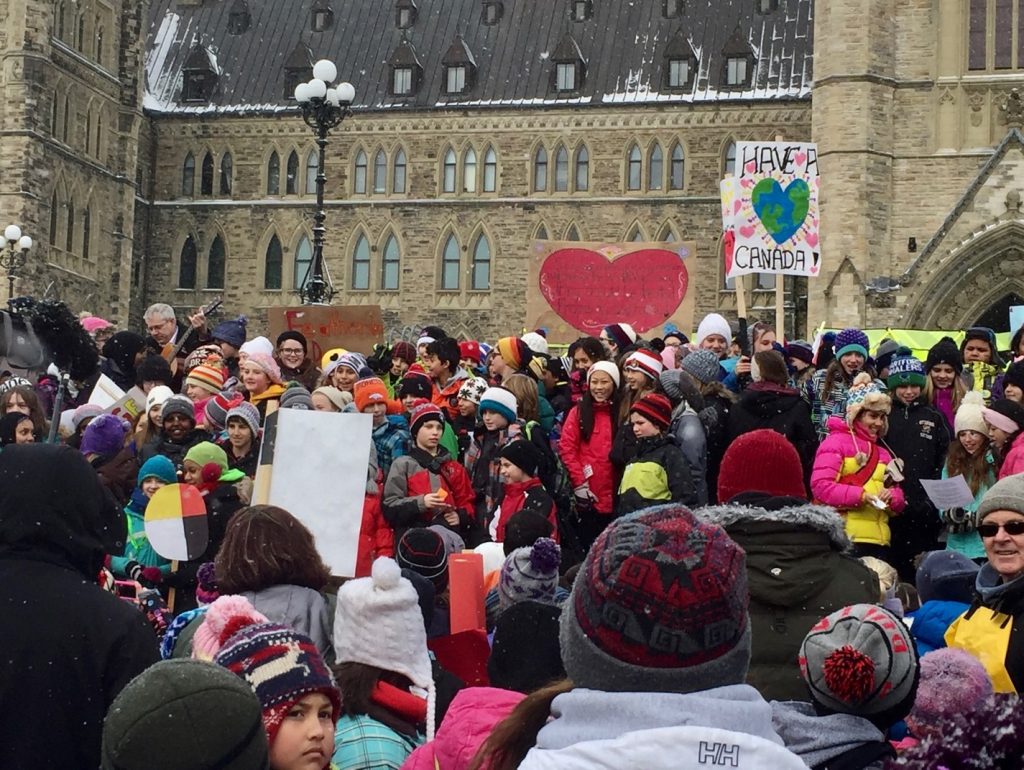Have a Heart Day reminds students of education inequalities faced by Indigenous children
By Cora Hansen
In addition to writing love notes this Valentine’s Day, students in Ottawa teacher Danielle Fontaine’s Grade 3-4 class are writing letters and poems addressed to government officials to promote love, equality and reconciliation for Have a Heart Day on Feb. 15 on Parliament Hill.
Have a Heart Day is a child and youth-led reconciliation event that brings together caring Canadians to help ensure the country’s Indigenous children have the services they need to grow up safely at home, get a good education and be healthy. The campaign is organized by the First Nations Child and Family Caring Society of Canada.
Students at Lady Evelyn Alternative Elementary School in Old Ottawa East have participated in Have a Heart Day for six years. When Fontaine heard the story of Shannen Koostachin, a youth advocate for First Nations education from the Attawapiskat First Nation in Northern Ontario, she knew she had to share the story with her students.
Unlike the school Fontaine has taught in for 28 years, Koostachin’s school was in a portable. The original building closed in 1979 due to a diesel fuel leak.
Upset by the condition of her school and others like it, Koostachin became an advocate for equality between education funding on and off reserve.
Koostachin was unable to fulfill her goal of equal funding in education, because she died in a car accident at age 15 in 2011. Her mission, however, lives on through Shannen’s Dream, a movement aiming to provide First Nations students safe schools and equitable education.
“When my kids at school found out (about the conditions of First Nations schools), they were just shocked and really wanted to move to action,” Fontaine said.
Shannen’s Dream echoes Have a Heart Day’s founding principle: equitable schools and fair access to welfare services for First Nations youth.
More than a decade ago, the FNCFCS took the federal government to court over what it deemed to be discrimination against First Nations children and youth in child welfare services funding.
In 2016, the Canadian Human Rights Tribunal ruled that the federal government does discriminate against First Nations children through inadequate funding.
Two years after the landmark ruling, little has been done to improve the unequal funding of schools, said Jennifer King, reconciliation and policy coordinator at the FNCFCS.
“There’s no reason why the Canadian government couldn’t be implementing the orders that have already come down from the tribunals. It’s important that people across the country stand up and know that we’re watching and that the response today is unacceptable,” King said.
Last year, more than 6,500 letters and poems were sent to elected officials across the country, and more than 700 students gathered on the steps of Parliament Hill to let their voices be heard.
“I think as adults we look at it and we get caught up with the politics or we think: ‘What is a treaty?’ or ‘What’s the history?’ We get caught up with complicated things,” said Fontaine.
Children understand the inequality as simply that, Fontaine said, and they are quick to speak up against it.
“Policy makers and decision makers who are in that building (Parliament) and can look out and see young people celebrating and showing their support for equity for a country that is free of discrimination,” said King.
The movement extends beyond the steps of Parliament Hill. Last year, more than 70 Have a Heart Day events took place across the country and are expected to take place once again this year.
“Have a Heart Day remains an important opportunity to show First Nations kids and families across the country that people are watching, and that people are paying attention and that they do believe in a country where discrimination is not an option,” said King.

